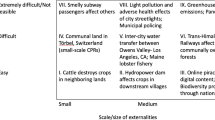Summary
This study examines the determinants of a neutral third party’s intervention in complex transaction relations. At its basis there rules the idea that the way through courts in order to get control of opportunism risks is often inefficient and that it would be better to let a third party intervene in functions of supervision and arbitration. The analyses of a third party’s intervention are based on a data sample which gives detailed information about 880 market contracts and co-operation projects. There is a tendency to often let a third party intervene if transaction parties intend to carry out especially high specific investments. Furthermore, third parties play a special role in respect of enforcing different contractual regulations or institutional arrangements. A third party intervenes, for example, in the following cases: if several (equal) partners are involved in a transaction, if hostages have to be exchanged or if sanctions have to be decided.
Similar content being viewed by others
Literatur
Alchain, Armen A./ Woodward, Susan (1987), Reflections on the Theory of the Firm, in: Journal of Institutional and Theoretical Economics, Vol. 143, S. 110–137.
Baumbach, Adolf/Lauterbach, Wolfgang/Albers, Jan/Hartmann, Peter (1991), Zivilprozessordnung mit Gerichtsverfassungsgesetz und anderen Nebengesetzen.
Bundesministerium für Forschung und Technologie (BMFT) (1994), Mikrosystemtechnik 1994–1999, Programm im Rahmen des Zukunftkonzeptes Informationstechnik.
Byrne, Barbara M. (1998), Structural equation modeling with LISREL, PRELIS, and SIMPLIS: basic concepts, applications, and programming.
Dietl, Helmut (1995), Institutionelle Koordination spezialisierungsbedingter wirtschaftlicher Abhängigkeit, in: Zeitschrift für Betriebswirtschaft, 65. Jg., S. 569–585.
GIB, ibi, VDI/VDE-IT (1995), Aus- und Bewertung des Förderungsschwerpunktes Mikrosystemtechnik, Integrierter Abschlussbericht für das Bundesministerium für Bildung, Wissenschaft, Forschung und Technologie.
Goldberg, Victor P. (1976), Toward an Expanded Economic Theory of Contract.
Hill, Charles W. L. (1990), Cooperation, Opportunism, and the Invisible Hand: Implications for Transaction Cost Theory, in: Academy of Management Review, Vol. 15, S. 500–513.
Jöreskog, Karl G./Sörbom, Dag (1984), LISREL VI: Analysis of Linear Structural Relationships by Maximum Likelyhood, Instrumental Variables, and Least Square Methods.
Klein, Benjamin/ Crawford, Robert G./ Alchian, Armen A. (1978), Vertical Integration, Appropriable Rents, and the Competetive Contracting Process, in: Journal of Law and Economics, Vol. 28, S. 297–326.
Kline, Rex B. (1998), Principles and Practice of Structural Equation Modeling.
Kronman, Anthony T. (1985), Contract Law and the State of Nature, in: Journal of Law, Economics and Organization, Vol. 1, S. 5–32.
Loehlin, John C. (1998), Latent Variable Models. An Introduction to Faktor, Path and Structural Analysis.
Macneil, Ian R. (1978), „Contracts: Adjustment of Long-term Economic Relation Under Classical, Neoclassical and Relational Contract Law“, in: Nortwestern University Law Review, Vol. 72, S. 854–905.
Picot, Arnold (1982), Transaktionskostenansatz in der Organisationstheorie, Stand der Diskussion und Aussagewert, in: Die Betriebswirtschaft, Jg. 42, S. 267–284.
Picot, Arnold (1990), Ökonomische Theorien der Organisation — Ein Überblick über neuere Ansätze und deren betriebswirtschaftliches Anwendungspotenzial, in: Ordelheide, Dieter/Rudolph, Bernd/Büsselmann, Elke (Hrsg.), Betriebswirtschaftslehre und ökonomische Theorie, S. 143–170.
Picot, Arnold (1993), Contingencies for the Emergence of Efficient Symbiotic Arrangements, in: Journal of Institutional and Theoretical Economics, Vol. 149, S. 731–740.
Picot, Arnold/Scheuble, S. (1997), Die Bedeutung der Information für Innovation und Wettbewerbsfähigkeit von Unternehmen, in: Mantwill, G. J. (Hrsg.), Informationswirtschaft und Standort Deutschland — Der Beitrag der Informationswirtschaft zur Wettbewerbsfähigkeit der Unternehmen.
Richter, Rudolf/Furubotn, Eirik (1996), Neue Institutionenökonomik — Eine Einführung und kritische Würdigung.
Riordan, Michael/ Sappington, David (1989), Second Sourcing, in: The Rand Journal of Economics, Vol. 20 (1), S. 41–58.
Schumacker, Randall E. (1998), Interaction and nonlinear effects in structural equation modeling.
Vogt, Jörg (1997), Vertrauen und Kontrolle in Transaktionen — Eine institutionenökonomische Analyse.
Wiggins, Steven N. (1991), The Economics of the Firm and Contracts: A Selective Survey, in: Journal of Institutional and Theoretical Economics, Vol. 147, S. 603–661.
Williamson, Oliver E. (1983), Credible Commitments: Using Hostages to Support Exchange, in: The American Economic Review, Vol. 73, S. 519–540.
Williamson, Oliver E. (1985/1990), Die ökonomischen Institutionen des Kapitalismus, Unternehmen, Märkte, Kooperationen.
Williamson, Oliver E. (1990), The Firm as a Nexus of Treaties, an Introduction, in: Aoki, M., Gustafsson, B., Williamson, O. E., the Firm as a Nexus of Treaties.
Williamson, Oliver E. (1993), The Evolving Science of Organization, in: Journal of Institutional and Theoretical Economics, Vol. 149, S. 36–63.
Windsperger, Josef (1996), Transaktionsspezifität, Reputationskapital und Koordinationsform, in: Zeitschrift für Betriebswirtschaft, 66. Jg., S. 965–978.
Wolff, Birgitta (1995), Organisation durch Verträge, Koordination und Motivation in Unternehmen.
Author information
Authors and Affiliations
Corresponding author
Additional information
Die empirischen Analysen im vorliegenden Beitrag beruhen auf einem vom BMBF Bundesministerium für Bildung, Wissenschaft, Forschung und Technologie geförderten Projektes „Ausund Bewertung des Förderungsschwerpunktes Mikrosystemtechnik“; vgl. dazu GIB, ibi, VDI/VDEIT 1995.
Rights and permissions
About this article
Cite this article
Becker, C. Ökonomische Analyse neoklassischer Verträge: Funktion und Wirkweise von Schiedsrichtern und Schlichtern in komplexen Transaktionsbeziehungen. Schmalenbachs Z betriebswirtsch Forsch 53, 39–54 (2001). https://doi.org/10.1007/BF03372641
Published:
Issue Date:
DOI: https://doi.org/10.1007/BF03372641




